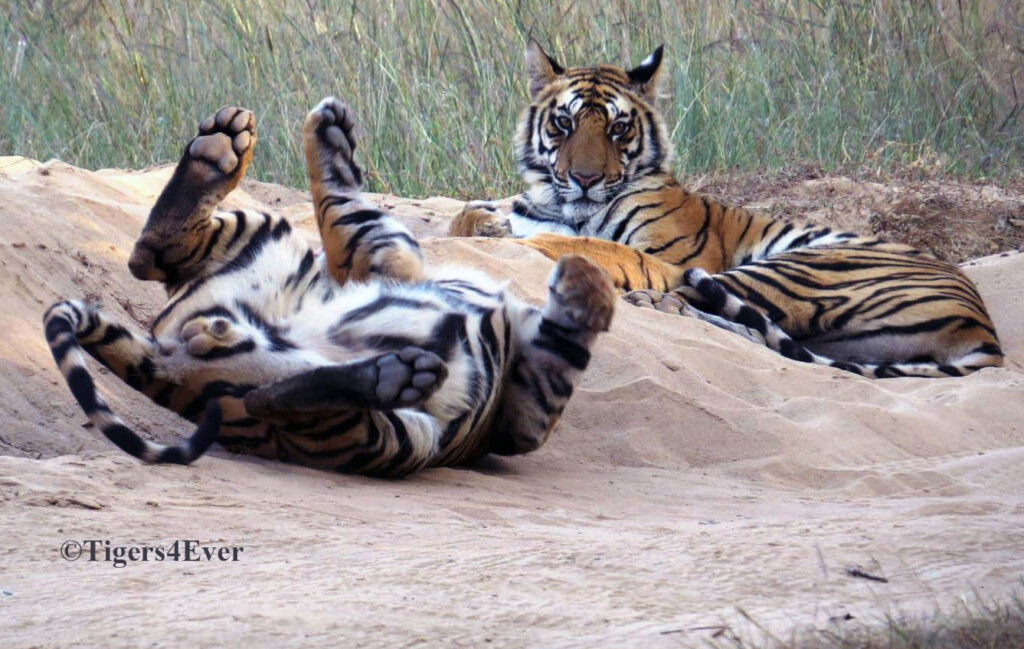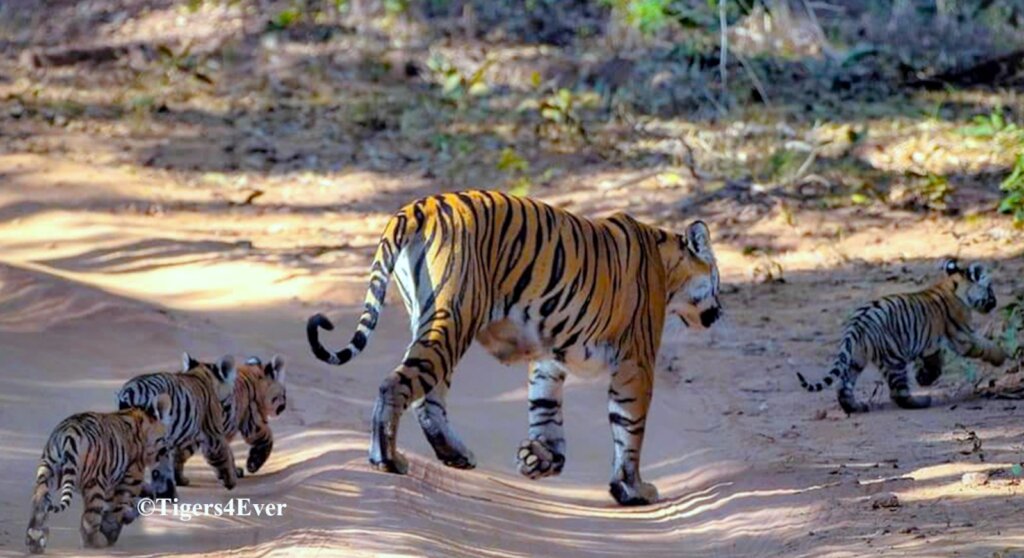By Dr Corinne Taylor-Smith | Project Leader
Your incredible support over the last 21 months has ensured that we could keep our anti-poaching patrols at triple standard patrolling levels until the end of 2021, thank you. It has been vital as wild tiger poaching has increased across India and Bandhavgarh can be targeted at any time as its increase in wild tiger numbers is well documented. Bandhavgarh is still suffering from the economic impact of the pandemic, as many other parts of India and beyond are. We’re well aware that many of the poachers who lay the snares and traps are just poor people desperate to feed themselves and their families, they are not the ring leaders who facilitate the trade in wild tiger body parts nor are they the ones making big bucks from their heinous acts. That’s why triple patrolling which enables us to protect an extra 1000km (624 miles) per month of wild tiger territory is so important. Without your support, this would be impossible, so thank you on behalf of the wild tigers we’re keeping safe.
Tiger Census
It only seems like yesterday when we broke the news that wild tigers in Bandhavgarh had more than doubled since we started our anti-poaching patrols in July 2015, but it’s actually more than three years since that count confirmed what we had hoped to achieve. Right now the 2021 wild tiger census is underway across the whole of India and Bandhavgarh is no exception. We are not anticipating numbers to double again, but we are hoping for another increase when the count results are in. After all 42 cubs were born during the pandemic lockdown and cub mortality has dramatically improved as we have reduced the number of retaliatory poisonings of wild tigers by 97.5% (in the last 6.5 years.
We know that 2022 is the Chinese year of the Tiger, a date set by all 13 tiger countries to double the number of wild tigers before at a country and at a global level. The bad news is that not all countries have seen their wild tiger numbers increase, in some cases where poaching is rife, wild tiger numbers have dramatically fallen, whilst numbers have significantly increased in both India and Nepal. It is unlikely sadly, that the target of 6400 wild tigers globally will be achieved by the 2022 target, and the economic impact pandemic won’t have helped. Nonetheless we eagerly await news of the expected increases in wild tiger numbers in India, and in Bandhavgarh particularly.
Winter Challenges
The weather in Bandhavgarh continues to present new challenges for our patrollers, as early morning mists and fog reduce visibility and make wild animal attacks more likely. Just a few days ago we received a report of a tiger suddenly appearing in the road in front of a young boy and girl on a motorised scooter. The huge male tiger growled aggressively at the youths and it took the youngsters all their courage to stay on board the scooter and make their escape. Imagine how dangerous such a situation could be for our patrollers on foot in the forest. Patroller safety is always at the forefront of our minds, which is why training both on the job and for emergency situations is an integral part of what we do. Some people ask us why we need fuel and transport for our anti-poaching patrols and there are two main reasons why. Firstly, our patrollers cover vast amounts of tiger territory on their daily patrols (on average around 125 km (78 miles) per day) and they are covering an area which is roughly the size of the country Wales (UK) or two thirds the size of the State of New Jersey in the USA, so they need to get to and from their foot patrolling start or finish points. The second reason is patroller safety: there are many possible emergency situations in the forest: freak weather; snake bites; scorpion stings; bites or attacks by other animals or even people; to name but a few, so we always have a vehicle on hand with an agreed rendezvous point or alternative escape point in case of need. It costs £38 (US$54) to provide such a vehicle for each day of patrolling, but enables us to transport a team of Tigers4Ever patrollers and Forest Department Rangers who accompany our patrols, as required. (https://goto.gg/28767).
The fog and mist may conceal a trap or snare intended for a tiger or other wild animal, so our patrollers must take extra care, in these conditions, as such devices are capable of severing a patroller’s foot, too. At such times and during night patrolling, the sturdy wooden canes provided for each of our patrollers are essential equipment for checking ahead for snares or traps, and keeping their feet safe. Even though the current Tiger Census is maximising the use of technology including camera traps; technology cannot disarm a poacher’s snare or trap set for a tiger, nor can it replace those dedicated men and women who risk their lives to keep wild tigers safe.
The colder winter season always brings some different challenges for our anti-poaching patrols and this winter is no exception with the poaching risk still high. Tiger-tiger conflict continues to increase as sub-adult male tigers leave their mothers and challenge each other and older male tigers for territorial rights. This increases the risk of encounters with aggressive or injured tigers, so again our patrollers must be alert to these extra dangers.
In recent years, winter has been bitterly cold in Bandhavgarh, with this in mind we equipped our patrollers with new sturdy boots, thick socks and warm jackets to aid their patrolling in the icy cold conditions. When the daytime temperatures can reach 25°C (77°F) but plummet close to 0°C (32°F) at night, in the jungles of India, food and drink plays a vital role in maintaining our patrols. The wild animals adapt to these colder temperatures which alters their daily routines and increases the chances of serendipitous wildlife encounters whilst on patrol. We always ensure that all our patrollers get three warm nutritious meals each whilst they are on duty, to help them fight off the cold and maintain their strength during foot patrolling, of wild tiger habitat in freezing conditions. Providing a team of patrollers with hot food and drinks costs as little as £25 (US$36) for a day, but ensures that they are able to keep at least 125 km (78 miles) of wild tiger territory safe. (https://goto.gg/28767).
As always, our anti-poaching patrols are working flat out to mitigate the risks caused by increased human encroachment levels, in Bandhavgarh, and the increases in poaching activity in both the neighbouring states and Madhya Pradesh. We don’t always get it right as the poaching incident in September this year has shown, but we always try to learn from our mistakes and improve where we can. We hope we can rely on your continued loyal support. (https://goto.gg/28767).
Wild Elephants
One of the biggest challenges for our anti-poaching patrols in recent months is the ever increasing human-animal conflict due to damage caused by and attacks on humans by the wild elephants, which arrived from Chhattisgarh and made Bandhavgarh their home. Our patrollers always pride themselves on being able to give good safety advice to the villagers they encounter in the forest, which helps to keep both animals and humans safe; but the wild elephants cause most trouble by entering the villages, destroying crops and attacking the humans who try to save their livelihood. So our patrollers have to help the villagers with other types of advice, in addition to personal safety advice, including the use of deterrents to reduce the risk of crop raiding/destruction by the wild elephants.
To date there haven’t been any retaliatory attacks or traps set for the wild elephants, but we must always be mindful of the possibility of this changing as a population already devastated by the economic impact of COVID19 suffers further hardship due to human-wildlife conflict. The only way we can address these risks and those of poaching or retaliatory poisoning is to keep patrolling increased until the risks subside. With this in mind, we hope to be able to maintain our anti-poaching patrols at a minimum of 2.5 times standard patrolling until at least the end of April 2022, when hopefully the current situation will begin to improve. (https://goto.gg/28767)
Making a Difference
Right now, thanks to your continued support and with tripled patrols, we’re covering an extra 1000 km (624 miles) per month of wild tiger territory when compared to the standard patrolling which we last did in June 2020. This gives us more time to search for snares; traps and signs of would be poisoners around forest areas where human encroachment is rife; and around the periphery of villages where crop raiding and livestock killing is rife. Increased patrolling helps us to curb the dangerous encroachment into wild tigers’ territories, which is still a huge problem, and allows us to provide safety advice for those trying to protect their crops and livestock from wandering elephants and tigers respectively.
With 42 new tiger cubs born since the start of the pandemic, we have many more wild tigers to keep safe now. So we still need your help. Your gift today, however large or small can make a huge difference as to whether Bandhavgarh’s wild tigers can survive these unprecedented threats:
Making your Gift Count Twice
From 13 -17 December 2021 inclusive, your new online monthly gift of £10 (US$14) per month won’t just help us to pay an anti-poaching patroller protecting wild tigers for 35 days per year; it will also qualify for a 200% match bonus on the first donation amount if you keep donating for 4 months or longer. That means when you donate at £10 (US$14) monthly in month 4 we will receive an extra £20 (US$28) from GlobalGiving to help us save wild tigers. Thus there has never been a better time to start a new monthly donation than now. (https://www.globalgiving.org/projects/saving-bandhavgarhs-wild-tigers/?show=recurring).
Without our help, we know that more wild tigers will die; and more humans will be mauled or killed due to encroachment or human-tiger conflict. Sadly, with every human life lost comes another threat to the wild tiger’s survival in the form of retaliation; thus we must protect both if we are to ensure that wild tigers can have a wild future.
Please don’t hesitate if you can help, your donation can be the difference between life and death for a wild tiger, as it helps to increase our patrolling when it is most needed. Every tiger and every tiger cub counts. Thank you for making our fight against poachers, the changing climate and human-animal conflict possible. (https://goto.gg/28767).
Links:
Project reports on GlobalGiving are posted directly to globalgiving.org by Project Leaders as they are completed, generally every 3-4 months. To protect the integrity of these documents, GlobalGiving does not alter them; therefore you may find some language or formatting issues.
If you donate to this project or have donated to this project, you can receive an email when this project posts a report. You can also subscribe for reports without donating.
Support this important cause by creating a personalized fundraising page.
Start a Fundraiser
